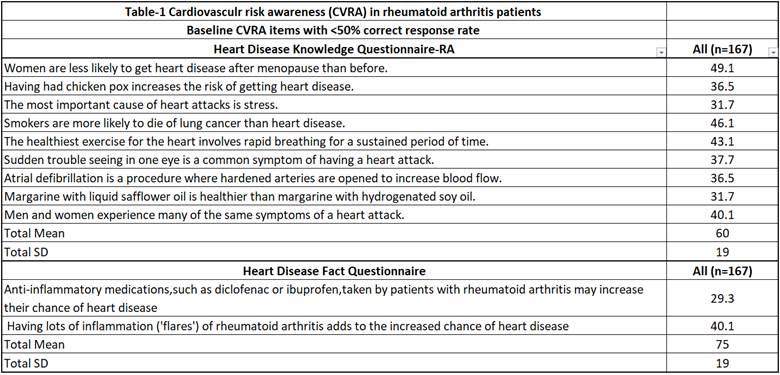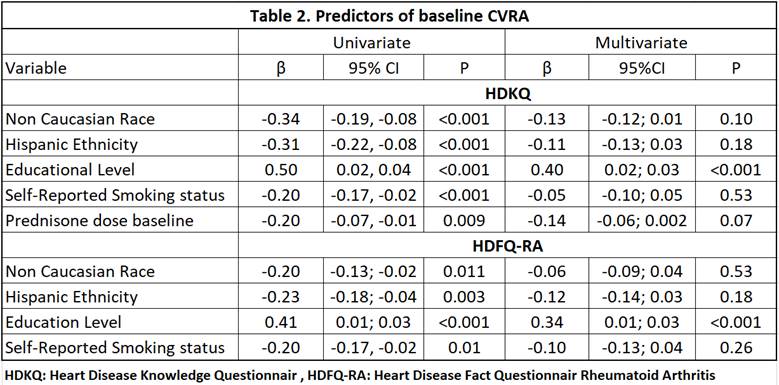Session Information
Date: Sunday, October 21, 2018
Title: Rheumatoid Arthritis – Diagnosis, Manifestations, and Outcomes Poster I: Comorbidities
Session Type: ACR Poster Session A
Session Time: 9:00AM-11:00AM
Background/Purpose: Despite dramatic change in treatment options in recent years, cardiovascular disease (CVD) mortality has not improved in rheumatoid arthritis (RA) and remains the leading cause of mortality in RA. Rates of screening and treatment for modifiable CVD risk factors in RA remains poor (27-45%). The primary objective was to evaluate baseline cardiovascular risk awareness (CVRA) in patients with RA.
Methods: Consecutive patients at two academic centers with a diagnosis of RA of at least 3 months’ duration were enrolled. Patients completed questionnaires on demographics, RA characteristics, active treatment and CVRA. CVRA was measured using the Heart Disease Knowledge Questionnaire (HDKQ; 30 items), and the Heart Disease Fact Questionnaire- RA (HDFQ-RA; 13 items). Descriptives for the study group and total correct response rates (%) were obtained for each tool. We then performed linear regression analysis with demographics (age, gender, ethnicity, and race), disease features (RA medications, RAPID3) and lifestyle (self-reported smoking and sedentary status) as independent variables to assess for correlates of CVRA.
Results: 167 RA patients participated. Mean (SD) age was 57.6±13.8 years; 87% were women. Thirty-seven percent were Caucasian and 40% African American. Forty-three percent were taking NSAIDS routinely, 60% methotrexate, and nearly 50% were on some dose of corticosteroid. Mean (SD) RAPID3 score was 11.8 (7.6). Self-reported CVD risks were: smoking (18%), hypertension (44%), diabetes mellitus (25%), High cholesterol (44%), overweight (46%), sedentary lifestyle (45%) and poorly controlled RA (48%).
Mean (SD) total correct response rates for HDKQ and HDFQ-RA at baseline were 60 (19) and 75 (19). For individual items, the correct response ratio was less than 50 for 9/30 HDKQ, and 2/10 HFFQ-RA items. Of note, participants performed poorly on the two items (role of NSAIDS and active RA) pertaining specifically to RA and increased CVD risk (Table 1). Determinants of poor CVRA on univariate analysis were less education, Hispanic ethnicity and Non-Caucasian Race (Table 2). On multivariate analysis, education was the sole independent predictor of CVRA, after adjusting for race, ethnicity, lifestyle and medication (Table 2).
Conclusion: General and RA specific understanding of CVRA is poor among RA patients. Education (not ethnicity/ race, or RA activity and medications) was the sole independent predictor of CVRA after adjusting for other variables. Interventions to improve CVRA should target those at risk and they need to be aligned to their educational level.
To cite this abstract in AMA style:
Jolly M, Kugasia A, Hussaini S, Fair J, Sengupta M, Walt L, Kazkauskaite R, Block JA. How Knowledgeable Are Patients with Rheumatoid Arthritis about Cardiovascular Disease? [abstract]. Arthritis Rheumatol. 2018; 70 (suppl 9). https://acrabstracts.org/abstract/how-knowledgeable-are-patients-with-rheumatoid-arthritis-about-cardiovascular-disease/. Accessed .« Back to 2018 ACR/ARHP Annual Meeting
ACR Meeting Abstracts - https://acrabstracts.org/abstract/how-knowledgeable-are-patients-with-rheumatoid-arthritis-about-cardiovascular-disease/


